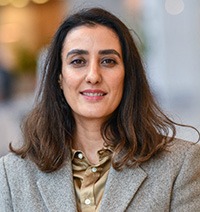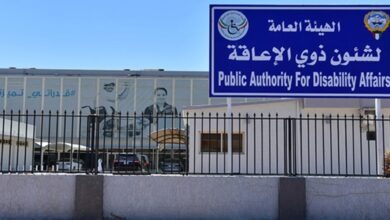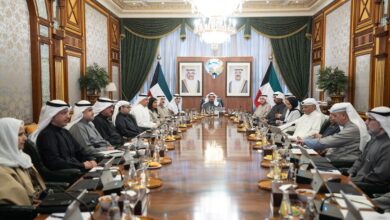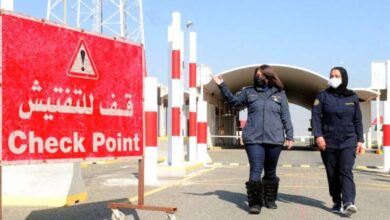Grassroots Energy and Civic Participation
Building the Future: Kuwait’s Resilient Path to Vision 2035 - Part 2


By Sarah Al Sabah
Special to The Times Kuwait
Our region faces a confluence of challenges that feel both heavy and defining, from geopolitical tensions to a deepening climate emergency and the ever-evolving technological advancements. Today, the call is to stay the course on our Vision 2035 transformation, using resilience and innovation to turn turbulence into opportunity.
National resilience in uncertain times means investing in our human capital, strengthening social cohesion, and thinking decades ahead. To do so, Kuwait must harness the full strength of its society. Kuwait must harness its youth and women, civil society and the private sector to remain future-ready and unshakeable in the face of disruption.
Last week, we looked at youth and women and their role in defining what our future will look like.This week we look at grassroots energy and civic participation.
Grassroots Energy and Civic Participation: Building a future-ready Kuwait is not just the job of officials or CEOs. Building the future-ready Kuwait requires all hands on deck, including a vibrant civil society and engaged communities.

One of our country’s greatest strengths is the grassroots energy of citizens who care deeply about their society, environment, and heritage. In fact, the true test of our Vision 2035 may not simply be whether we can construct new infrastructure, but whether we can “build the future with our own people and for our own future.” That means unleashing the power of civic participation and volunteerism, so that every Kuwaiti feels they have a stake and a say in the nation we are building together.
Throughout Kuwait’s history, civil society groups, from charitable organizations to cultural clubs, have played an outsized role in fostering social cohesion and addressing community needs. This spirit continues in new forms today. For example, Kuwaiti youth have formed grassroot initiatives to tackle the pressing issue of climate change.
One notable youth-led nonprofit, AlManakh (Arabic for ‘climate’), was founded by young Kuwaiti environmentalists to raise awareness about climate change impacts and sustainability in Kuwait. Through public education, research, and community events, they highlight how a hotter planet directly affects our health and the livability of our cities, and they advocate for solutions.

Their message is that a sustainable future must be built by everyone, not just policymakers—an ethos at the heart of Vision 2035’s environmental pillar. Similarly, volunteer cleanup campaigns, beach conservation groups, and community recycling initiatives driven by students and activists have taken root, showing a rising civic consciousness about environmental stewardship. These grassroots efforts do more than produce a cleaner park or a single workshop; they help build a culture of shared responsibility for the nation’s well-being.
Civil society also contributes to social welfare and education. Kuwaiti charities and NGOs have long extended a helping hand to those in need, both locally and abroad, earning Kuwait international recognition as a humanitarian center. Now, reforms are strengthening this sector. Just this week, the government approved a new framework to allow charities to collect donations and carry out projects inside and outside Kuwait under stricter transparency rules.
By weeding out misuse and ensuring aid reaches real beneficiaries, these measures encourage more citizens to participate confidently in philanthropy and community work. It is a reminder that good governance and civic initiative go hand in hand. Once people see accountability and results, they are more likely to get involved.
Crucially, grassroots energy is fueling not only social projects but also innovation. Young Kuwaitis are proving to be ‘eco-entrepreneurs’ and student inventors at the grassroots level, experimenting with bold ideas in clean energy, urban farming, fintech, and more. In many cases, they start small. A university project, a hackathon prototype, a neighborhood pilot. Small sparks can ignite larger changes if supported.
Recognizing this, Kuwait can do more to tap into the wellspring of ideas bubbling up from its communities. One proposal has been to create a National Youth Sustainability Corps and public-sector innovation challenges that invite young citizens to help solve real problems (like energy efficiency or digitizing public services) in partnership with ministries.
By moving from token youth engagement to true partnership, Kuwait can build a generation of changemakers with the skills and stakes to drive Vision 2035 forward. This means offering funding, mentorship, and platforms for youth-led startups and social enterprises that target sustainability challenges.
Recent partnerships show the way: the Sustainability Heroes program launched by private firms and NGOs (Zain, Nestlé, and INJAZ Kuwait) is training hundreds of university students to develop entrepreneurial solutions for environmental and social challenges. Classrooms are being turned into incubators for startups that address community needs, guided by business mentors and fueled by youthful creativity.
When corporations, non-profits, and young talent team up like this, it creates a virtuous cycle of innovation and civic engagement. The broader benefit of an active civil society is the trust and unity it builds. Involvement in local initiatives, whether it is a beach cleanup or a tech meetup, brings people together across generations and backgrounds.
It reinforces the idea that nation-building is a shared project, not solely the domain of officials. That sense of shared purpose can be the true bedrock of sustainable societies. Indeed, when communities organize environmental literacy programs in mosques and youth centers, or volunteer for a common cause, they strengthen the social fabric even as they solve problems. Kuwait’s social solidarity, our tradition of helping neighbors, valuing moderation, and rallying in hard times, is already aligned with the ethos of sustainability and resilience.
By translating those values into modern systems and institutions, through active civic participation, we ensure that our development path remains uniquely Kuwaiti and broadly supported. In a region racing toward futuristic megaprojects, Kuwait has an opportunity to lead in a different way: by building a model of inclusive, citizen-driven, values-based sustainability. This is nation-building from the ground up, and it will be a cornerstone of staying the course on Vision 2035.
[The concluding part of this article on ‘Building the Future: Kuwait’s Resilient Path to Vision 2035’ will be published next week. Ed]
Editor’s Note: This timely op-ed offers a compelling perspective on Kuwait’s resilience in the face of regional and global challenges. By blending strategic policy analysis with a human-centered narrative, the article speaks to both decision-makers and the general public. The article effectively links Vision 2035 objectives to current events and calls for inclusive participation from all sectors of society. Its emphasis on youth empowerment, women’s leadership, and private sector innovation makes it highly relevant for ongoing national conversations about reform, sustainability, and Kuwait’s role in the Gulf and the world. The piece is recommended for publication as part of The Times Kuwait’s ongoing series on Vision 2035 and national development.












